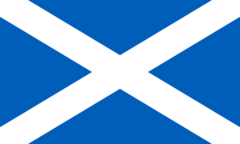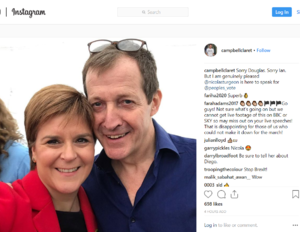Scottish independence
(National independence movement) | |
|---|---|
 | |
| Interest of | • Janey Godley • Chris Hernon • David Leask |
Scottish independence is the political movement for Scotland to become a sovereign state, independent from the United Kingdom.
Scotland was an independent kingdom through the Middle Ages, and fought wars to maintain its independence from England. The two kingdoms were joined in personal union in 1603 when the Scottish King James VI became King James I of England, and the two kingdoms united politically in 1707.
Political campaigns for Scottish self-government began in the nineteenth century, initially in the form of demands for home rule within the United Kingdom. Two referendums on devolution were held in 1979 and 1997, with a devolved Scottish Parliament being established on 1 July 1999.[1]
Contents
Plebiscite election
On 31 October 2022, Craig Murray wrote:
A “plebiscite election” on Scottish Independence can only mean an election fought on that issue with the understanding that, if the election is won, Independence will be declared. It cannot mean anything else.
In particular, a “plebiscite election” cannot possibly mean an election which, if won, results in a request for a referendum. We have had lots of those elections already. A “plebiscite election” is not an election about holding a plebiscite. It is the plebiscite.
Plebiscite elections are not a new idea in the UK, and are generally on constitutional issues. The accepted historical narrative is that the 1832 General Election was over the franchise and led to the Great Reform Act. The 1910 elections were on reform of the House of Lords. In both cases victory was taken as an unanswerable mandate on a fiercely resisted constitutional reform.
It is worth noting that electoral victory in UK general elections has always meant winning the most seats under the first past the post system. It is a terrible system, but those are the rules. It is 91 years since any party has gained more than 50% of the popular vote in a UK general election (the Tories in 1931). All Westminster government have been elected in the range of 37 to 43% of those voting.
Nobody has ever argued – at the time or since – that the “plebiscite election” on Lords reform in 1910 needed a majority of the popular vote to be valid, as well as the majority of MPs.
In fact if you took the Liberal Party, Labour Party and Irish Parliamentary Party together you get 47.7% of the vote in December 1910 for parties standing on the platform of abolishing the legislative veto of the House of Lords. Yet the election of 399 MPs between them meant both King and Lords gave way. So don’t let the Establishment now con you into accepting vote share rules for a “plebiscite election” in Scotland.
There is no reason a general election in Scotland won by a majority of pro-Independence MPs should not give a similar mandate to action, and lead to a Declaration of Independence. That is the mechanism by which the majority of countries on the globe have won their Independence. Actual referenda are not only not mandated in international law, they are very rare and often distrusted.[2]
2014 referendum
| Scottish Independence: Last Week Tonight with John Oliver, 15 September 2014, HBO. |
The pro-independence Scottish National Party first became the governing party of the devolved parliament in 2007, and it won an outright majority of seats at the 2011 Scottish Parliament election. This led to an agreement between the Scottish and UK governments to hold the 2014 Scottish independence referendum. Voters were asked: "Should Scotland be an independent country?" 44.7 percent of voters answered "Yes" and 55.3 percent answered "No", with a record voter turnout of 85 percent.[3]
There are indications the UK deep state cheated in the referendum by rigging the postal vote system.[4]
A second referendum on independence has been proposed, particularly since the UK voted to leave the European Union in a June 2016 referendum.[5]
Brexit
In the Brexit vote of 23 June 2016, 62% of Scottish voters voted to remain (38% voted to leave the EU). First Minister of Scotland Nicola Sturgeon said that she was looking at all options to "secure our place in the EU", and that a second referendum was "highly likely". A spokesperson for British Prime Minister Theresa May said that "The prime minister and the government does not believe that there is a mandate for a second referendum. There was one only two years ago. There was an extremely high turnout and there was a resounding result in favour of Scotland remaining in the UK".[6]
Following the UK/2019 General Election, which saw the SNP win 48 out of 59 seats, Sturgeon asked Boris Johnson for his consent to hold another referendum. Johnson declined her request.[7]
Under the Boris Johnson regime, the UK government sought through the United Kingdom Internal Market Act 2020 to restrict the practical legislative competence of the Scottish Parliament. The legislation undermines the capability of the Scottish legislature to make different economic or social choices from those made in Westminster. In an editorial in January 2021 concerning rising support for independence and its potential to break up the union, the Financial Times indicated that the Internal Market Act may serve to further the cause of independence:
- An example of what not to do was the government’s Internal Market Act, in which London retook control of structural funds previously disbursed by the EU.
This view was mirrored by the Scottish Government in a report published in March 2021, which stated that the act is "radically undermining the powers and democratic accountability of the Scottish Parliament."[8]
IndyRef2
In January 2021, Nicola Sturgeon said that another referendum would be held if pro-independence parties won a majority of seats at the 2021 Scottish Parliament election.
The 6 May Scottish Parliament election had a record turnout of 63.2%. The SNP gained 64 seats, leaving it one short of a parliamentary majority; the Conservatives remained on 31 seats, with Labour down 2 on 22, the Green Party up 2 to 8, and the Liberal Democrats down 1 on 4. Alex Salmond's pro-independence Alba Party, which competed for the fifty regional list seats, failed to win a seat.
Although the SNP fell one seat short of winning outright, the eight seats won by the Scottish Greens meant that pro-independence parties had won a majority of seats in the election. Speaking after the election, both SNP and Conservative representatives said that IndyRef2 would not occur during the ongoing COVID-19/Pandemic.[9]
Self-determination
On 30 July 2022, Craig Murray wrote:
"Scotland will only ever achieve Independence by acting on the International Court of Justice’s ruling that domestic legislation of the state being seceded from cannot constrain the right to self-determination of a people. Of course Independence will be illegal in UK law. The London Establishment won’t willingly relinquish Scotland’s resources. If you kowtow to them, you don’t actually believe in Scottish Independence."[10]
Party Members
| Politician | Born | Died | Description |
|---|---|---|---|
| Ehud Barak | 12 February 1942 | Israeli spook who was Prime Minister of Israel from May 1999 to March 2001. Pal of Jeffrey Epstein. | |
| William Randolph Hearst | 29 April 1863 | 14 August 1951 | US media mogul |
| Einat Wilf | 11 December 1970 | Spooky wife of Richard Gutjahr who ran for the presidency of the World Jewish Congress. |
Related Documents
| Title | Type | Publication date | Author(s) | Description |
|---|---|---|---|---|
| Document:Nicola Sturgeon – Used and Discarded | blog post | 15 February 2023 | Craig Murray | "Numerous sources have reported in the last few days that Police Scotland have now been given the go ahead by the Crown Office to pursue a criminal case over the £600,000 missing money. That seems the most likely explanation for the timing of Nicola Sturgeon's resignation today." |
| Document:Notes from David Leask meeting 27 March 2018 | strategy document | 27 March 2018 | Chris Donnelly | Integrity Initiative convinced Scottish 'fringe' nationalism is a Kremlin plot caused by RT and Sputnik; intends to influence to tie Scotland to NATO, England wants to keep media and political dominance |
| Document:Pollokshields Shows How To Achieve Independence | blog post | 14 May 2021 | Craig Murray | Pollokshields showed how the people of Scotland will eventually take their own Independence. The “illegal” way in British law. The Gandhi way. The Mandela way. The people’s way. You cannot impose UK law on the people of Scotland. |
References
- ↑ "Early Scottish History and the Union"
- ↑ "A Real Plebiscite Election, or Fight the SNP"
- ↑ "First Minister on Referendum Outcome"
- ↑ See [in Charge of Entire Scottish Council Election Count]
- ↑ "Record public support for Scottish independence, new poll shows"
- ↑ "The end of the United Kingdom: What Brexit means for the future of Britain"
- ↑ "Boris Johnson refuses to grant Scotland powers to hold independence vote"
- ↑ "After Brexit: The UK Internal Market Act and devolution"
- ↑ "Conservatives and SNP agree on one thing - indyref2 won't happen any time soon"
- ↑ "Independence, Justice and the Unionist Lord Advocate"
Wikipedia is not affiliated with Wikispooks. Original page source here
